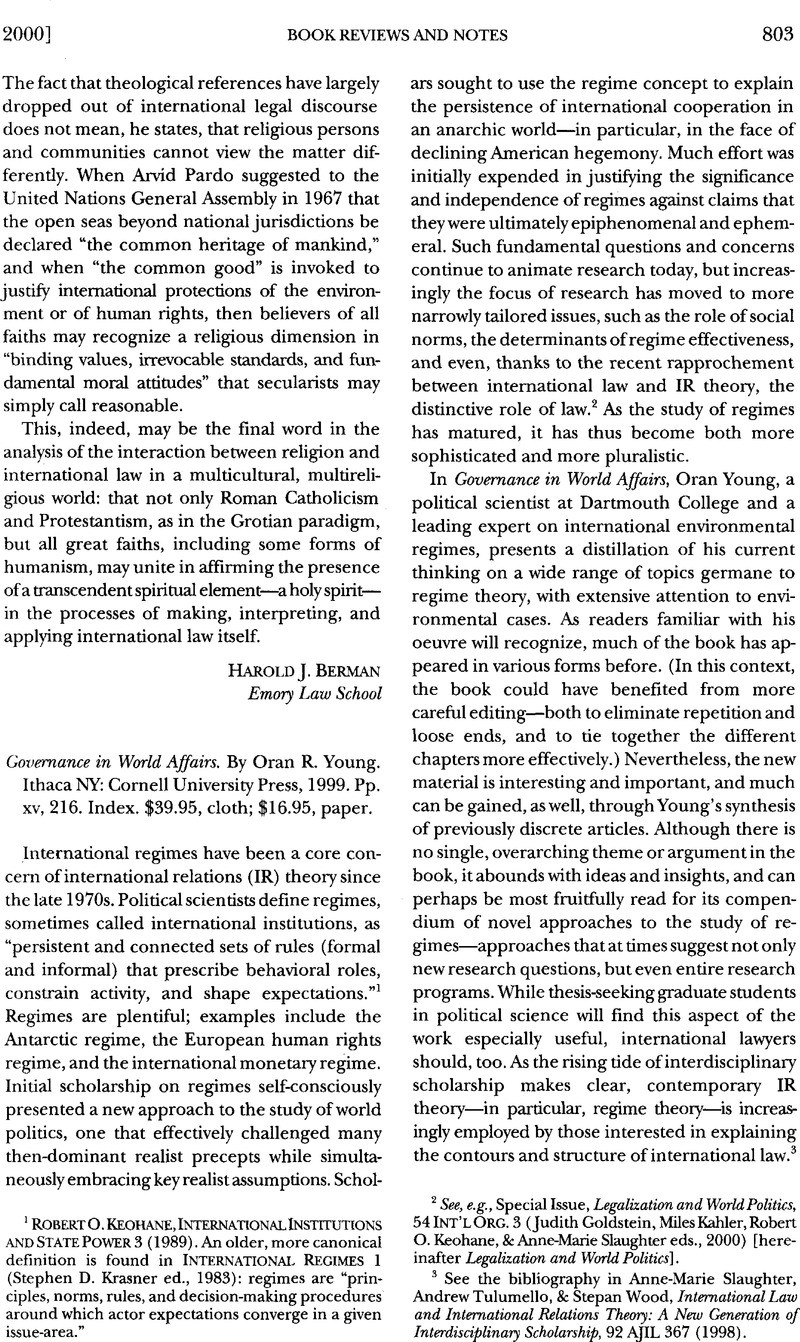No CrossRef data available.
Published online by Cambridge University Press: 27 February 2017

1 Robert O., Keohane, International Institutions and State Power 3 (1989)Google Scholar. An older, more canonical definition is found in International Regimes 1 (Stephen D. Krasner ed., 1983): regimes are “principles, norms, rules, and decision-making procedures around which actor expectations converge in a given issue-area.”
2 See, e.g., Issue, Special, Legalization and World Politics, 54 Int’l Org. 3 (Goldstein, Judith, Kahler, Miles, Robert O., Keohane, & Anne-Marie, Slaughter eds., 2000)Google Scholar [hereinafter Legalization and World Politics].
3 See the bibliography in Anne-Marie, Slaughter, Tulumello, Andrew, & Wood, Stepan, International Law and International Relations Theory: A New Generation of Interdisciplinary Scholarship, 92 AJIL 367 (1998)Google Scholar.
4 Abbott, Kenneth, Modern International Relations Theory: A Prospectus for International Lawyers, 14 Yale J. Int’l L. 367 (1989)Google Scholar.
5 Lessig, Lawrence, The New Chicago School, 27 J. Legal Stud. 661 (1998)CrossRefGoogle Scholar.
6 See Young, Oran, Compliance and Public Authority (1979)Google Scholar.
7 See, e.g., George W., Downs & David M., Rocke, Optimal Imperfection? Domestic Uncertainty and Institutions in International Relations ch. 4 (1995)Google Scholar; Sykes, Alan, Mandatory Retaliation for Breach of Trade Agreements: Some Thoughts on the Strategic Design of Section 301, 8 B.U. Int’l L.J. 301 (1990)Google Scholar.
8 See, e.g., Simmons, Beth, Compliance with International Agreements, 1 Ann. Rev. Pol. Sci. 75 (1998)CrossRefGoogle Scholar; Kahler, Miles, Conclusion: The Causes and Consequences of Legalization, in Legalization and ‘World Politics, supra note 2 Google Scholar; Goldstein, Judith & Lisa L., Martin, Legalization, Trade Liberalization, and Domestic Politics: A Cautionary Note, in Legalization and World Politics, supra note 2, at 603 Google Scholar; Raustiala, Kal, Compliance and Effectiveness in International Regulatory Cooperation, 32 Casew. Res. J. Int’l L. (2000)Google Scholar.
9 See Downs, George, Rocke, David, & Barsoom, Peter, Is the Good News About Compliance Good News About Cooperation? 50 Int’l Org. 367 (1996)Google Scholar.
10 See, e.g., Chayes, Abram & Antonia, Handler Chayes, The New Sovereignty (1995)Google Scholar.
11 Raustiala, Kal & David G., Victor, Conclusions, in The Implementation and Effectiveness of International Environmental Commitments 681 (David G., Victor, Raustiala, Kal, & Eugene B., Skolnikoff eds., 1998)Google Scholar.
12 Brunnee, Jutta, Wrap-up Plenary: What’s Next in Implementation, Compliance, and Effectiveness? 91 ASIL Proc. 505 (1997)Google Scholar.
13 See, e.g., Eldredge, Niles, Macroevolutionary Dynamics: Species, Niches, and Adaptive Peaks (1989)Google Scholar; Stephen, Jay Gould, Wonderful Life (1989)Google Scholar.
14 See James G., March & Olsen, Johan, Rediscovering Institutions: The Organizational Basis of Politics (1989)Google Scholar.